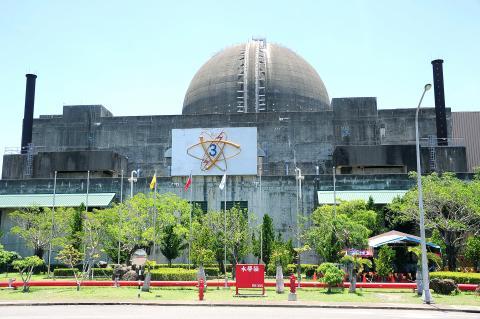Taiwan has performed relatively well in protecting government agencies and infrastructure from overseas cyberattacks, Minister of Digital Affairs Audrey Tang (唐鳳) said yesterday, following reports that China is recruiting private contractors to spy on dissenters and conduct cyberattacks.
Tang defended the Ministry of Digital Affairs’ performance in safeguarding the nation’s cybersecurity systems in a Yahoo talk show hosted by political commentator Wang Shi-chi (王時齊).
Taiwan experiences millions of cyberattacks and cybersecurity breach attempts every day, and the intensity of such attacks only increases when there is a major event, from the visit of then-US House of Representatives speaker Nancy Pelosi in August 2022, to the presidential and legislative elections in January, Tang said.

Photo: CNA
Staff at the National Institute of Cybersecurity are monitoring attacks against government agency Web sites and informing the authorities when attacks are detected, she said.
“Most cyberattacks target the external service portals of government agencies, including via messages to ministers,” Tang said. “Moreover, hackers need not actually break into the Web sites. All they have to do is prevent people from accessing the sites by freezing the pages.”
A recent Wall Street Journal report on leaked documents of Chinese cybersecurity firm I-Soon (安洵信息), a company that competed for Chinese government contracts, that private firms have been recruited by Beijing to monitor dissenters inside and outside its borders.
The documents were originally uploaded to an online platform for developers before being erased.
“What we have seen from the documents is that they launched cyberattacks against India, Thailand, Vietnam and NATO countries. However, their cyberattacks against government agencies and key infrastructure in Taiwan seemed less successful, as the report only mentioned that they only managed to hack three private firms in Taiwan,” Tang said, adding that the ministry has worked to protect Taiwan’s cybersecurity systems.
Cybersecurity experts from 18 countries were invited to Taiwan to engage in offensive and defensive cyberexercises, in which they tried launching cyberattacks against Taiwanese systems.
“Taiwan is often at the receiving end of the latest offensive cybertechnology. Through the exercises, these countries can also examine if they have experienced similar attacks,” Tang said. “If we can withstand new cyberattacks with these battle-tested measures, the measures can also be applied to help other countries resist cyberattacks.”
Cyberattacks could come from China or other hostile regimes, but can be difficult to trace as connections can be rerouted through several countries, she said.
“Different hackers specialize in different forms of cyberattacks, and they form support networks as well,” she said. “Once they detect changes in the way we defend against cyberattacks, they change their tactics, too.”
Taiwan has also formed a united front with other countries by sharing cybersecurity intelligence, and convinced Microsoft and other public firms to have operations here, she said.

A fugitive in a suspected cosmetic surgery fraud case today returned to Taiwan from Canada, after being wanted for six years. Internet celebrity Su Chen-tuan (蘇陳端), known as Lady Nai Nai (貴婦奈奈), and her former boyfriend, plastic surgeon Paul Huang (黃博健), allegedly defrauded clients and friends of about NT$1 billion (US$30.66 million). Su was put on a wanted list in 2019 when she lived in Toronto, Canada, after failing to respond to subpoenas and arrest warrants from the Taipei District Prosecutors’ Office. Su arrived at Taiwan Taoyuan International Airport at 5am today on an EVA Air flight accompanied by a

An essay competition jointly organized by a local writing society and a publisher affiliated with the Chinese Communist Party (CCP) might have contravened the Act Governing Relations Between the People of the Taiwan Area and the Mainland Area (臺灣地區與大陸地區人民關係條例), the Mainland Affairs Council (MAC) said on Thursday. “In this case, the partner organization is clearly an agency under the CCP’s Fujian Provincial Committee,” MAC Deputy Minister and spokesperson Liang Wen-chieh (梁文傑) said at a news briefing in Taipei. “It also involves bringing Taiwanese students to China with all-expenses-paid arrangements to attend award ceremonies and camps,” Liang said. Those two “characteristics” are typically sufficient

Restarting the No. 2 reactor at the Ma-anshan Nuclear Power Plant would take up to 18 months, Minister of Economic Affairs J.W. Kuo (郭智輝) said today. Kuo was answering questions during a meeting of the Legislative Yuan’s Economics Committee, where legislators are considering amendments to the Renewable Energy Development Act (再生能源發展條) amid concerns about the consequences of the Pingtung County reactor’s decommissioning scheduled for May 17. Its decommissioning is to mark the end of Taiwan’s nuclear power production. However, Chinese Nationalist Party (KMT) lawmakers have proposed an amendment to the Nuclear Reactor Facilities Regulation Act (核子反應器設施管制法) that would extend the life of existing

A magnitude 5.9 earthquake that struck about 33km off the coast of Hualien City was the "main shock" in a series of quakes in the area, with aftershocks expected over the next three days, the Central Weather Administration (CWA) said yesterday. Prior to the magnitude 5.9 quake shaking most of Taiwan at 6:53pm yesterday, six other earthquakes stronger than a magnitude of 4, starting with a magnitude 5.5 quake at 6:09pm, occurred in the area. CWA Seismological Center Director Wu Chien-fu (吳健富) confirmed that the quakes were all part of the same series and that the magnitude 5.5 temblor was